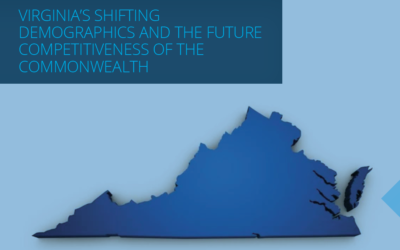COVID-19 and North Carolina’s Shifting Demographics
This study reveals COVID-19’s impact on the geo-demography of North Carolina.
Report by James H. Johnson Jr., Ph.D, Jeanne Milliken Bonds, MPA
Kenan-Flagler Business School UNC-Chapel Hill
Allan M. Parnel Vice President, Cedar Grove Institute for Sustainable Communities Mebane, NC
August, 2022
Home | Publications | COVID-19 and North Carolina’s Shifting Demography
ABSTRACT
Post 2020 Census population estimates covering the first fifteen months of the pandemic are analyzed. The results reveal COVID-19’s impact on the geo-demography of the state, highlight disturbing demographic trends, and raise pressing questions requiring immediate policy attention if North Carolina is to remain attractive as a place to live, work, play, and do business.
INTRODUCTION
North Carolina’s population grew more rapidly than the population of the U.S. during the first 15 months of the pandemic (1.1% vs. 0.1%) according to estimates of residential population change and components of change released by the U.S. Census Bureau for the period April 1, 2020 to July 1, 2021 (U.S. Census Bureau, Population Division, 2021, 2022). We use these post-2020 Census population estimates in this essay first, to highlight COVID-19’s impact on the geo-demography of our state; and second, to highlight several disturbing trends and pressing questions that require the immediate attention of state and local community leaders (Johnson, 2020, 2021a; Johnson, Bonds, & Parnell, 2021a,b).
To continue reading, dowload the .pdf above, or click here.
About the Authors
James H. Johnson, Jr. is the William Rand Kenan, Jr. Distinguished Professor of Strategy and Entrepreneurship in the Kenan-Flagler Business School and Director of the Urban Investment Strategies Center in the Frank Hawkins Kenan Institute of Private Enterprise at UNC-Chapel Hill.
Jeanne Milliken Bonds is a Professor of the Practice, Impact Investment and Sustainable Finance in the Kenan-Flagler Business School and the Department of Public Policy at UNC-Chapel Hill.
Allan M. Parnell is a Senior Research in the Kenan Institute’s Urban Investment Strategies Center and Vice President of the Mebane, NC-based Cedar Grove Institute for Sustainable Communities.
The Kenan Institute serves as a national center for scholarly research, joint exploration of issues, and course development with the principal theme of preservation, encouragement, and understanding of private enterprise.
Related Articles
North Carolina after the Pandemic: A Model for Creating a Successful Business Ecosystem for All
North Carolina after the Pandemic: A Model for Creating a Successful Business Ecosystem for AllUsing a place-based approach to foster an inclusive entrepreneurship and small business ecosystemWhite Paper written by James H. Johnson Jr., Jeanne Milliken Bonds, and...
Virginia’s Shifting Demographics and the Future Competitiveness of the Commonwealth
Virginia's Shifting Demographics and the Future Competitiveness of the CommonwealthA Whole Community Health approach to Virginia’s rapid population growth over the past three decades.White Paper written by James H. Johnson Jr., Allan M. Parnel, Jeanne Milliken Bonds,...
Real Estate Alert! Gale Force Demographic Wind Gusts Ahead
Real Estate Alert! Gale Force Demographic Wind Gusts AheadNewcomers from other states and abroad are principally responsible for North Carolina’s population boom–growth by 3.9 million– since 1990. However, seven powerful demographic disruptors—analogous to gale force...







